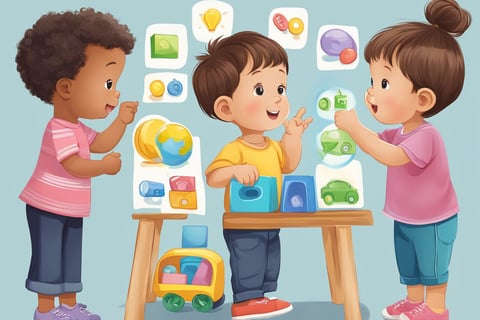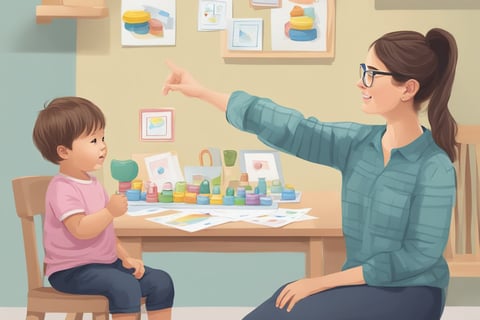From Words to Phrases: Enhancing Early Language Development
Explore how children transition from single words to complex phrases. Learn strategies to boost early communication skills and support language growth.
LANGUAGELANGUAGE TODDLERS
11/29/20242 min read
Language Development: From Words to Phrases - Enhancing Early Communication Skills
Language development in children is a fascinating journey that encompasses the transition from single words to complex phrases. From the first utterances like "mama" or "dada," children quickly progress to forming more elaborate sentences, reflecting their expanding understanding of the world. This growth is not only about vocabulary increase but also about mastering the rules of language structure.
Communication skills in early childhood are essential for cognitive development and social interaction. Each word and phrase learned represents a building block that supports further learning and interaction with others. Observing this progression offers crucial insights into how children perceive and interpret their environment, which can be instrumental for parents and educators in supporting their language journey.
Cultural and environmental factors significantly influence language acquisition. Children often mimic sounds and speech patterns from their surroundings, integrating them into their language use. This blend of influences highlights the diverse nature of language development and encourages a deeper look into how children from various backgrounds achieve linguistic milestones.
Toddlers Expanding Vocabulary
Toddlers rapidly develop from saying simple words to formulating basic phrases and sentences. This growth is pivotal for expressing their needs and understanding the world around them.
Forming Sentences to Express Needs
As toddlers move beyond single words, they begin combining them to form simple sentences. This skill helps them clearly express needs such as "want milk" or "read book."
Parents notice that these phrases often revolve around daily routines, reflecting a child’s world. Attention and interaction from caregivers play crucial roles in refining this skill, as children learn through repetition, correction, and encouragement.
Developmental milestones vary; some toddlers may form two-word combinations earlier. Providing a language-rich environment aids this progress. Engaging in conversations, reading together, and encouraging mimicry are effective strategies. These interactions cultivate a space where toddlers feel comfortable expanding their vocabulary further.
Toddlers Simple Questions
Toddlers, beginning to form sentences, often start asking simple questions. This marks an important milestone in their language development.
Why? What? Where?
Young children typically begin with basic question words such as "why," "what," and "where." These are the building blocks of inquiry, driven by their natural curiosity and desire to explore the world around them.
Repeating Questions
When engaging in conversation, toddlers might repeat the same question multiple times. This repetition helps reinforce their learning and understanding of both language and the context of their environment.
Short and Simple
Questions from toddlers are usually short and straightforward. They might ask, "Where ball?" or "What that?" Such constructions demonstrate their growing ability to combine words into meaningful phrases.
Encouragement and Interaction
Parents and caregivers play a crucial role in responding to these questions. Encouraging toddlers to ask and answer questions fosters their language skills. Interactive dialogue contributes to vocabulary expansion and cognitive development.






Explore
Discover engaging educational toys and learning tools.
Contact Us
thescholarlysandbox@outlook.com
© 2025. All rights reserved.
Affiliate disclosure: As an Amazon Associate, we may earn commissions from qualifying purchases from Amazon.com.
